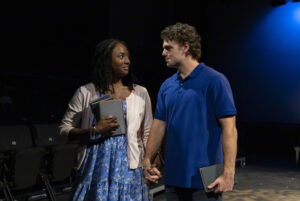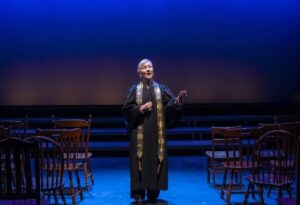From the Nashville Rep.
Our Town at TPAC: “Nice town, y’know what I mean?”
Running from October 25 through November 3 at the Tennessee Performing Arts Center is the Nashville Repertory Theatre’s production of Thornton Wilder’s Our Town. The production is excellent, and it seems to fulfill many of what seem to be Wilder’s intentions in the creation of this diversion.
Our Town was completed in 1938, at the very height of the great depression and with a second global war and catastrophe looming in the political contests in Europe. The third act was written in September of that year, while Wilder was in Munich, a little over a month after the Nazi Luftwaffe had demonstrated their new and devastating Messerschmitt Bf109 fighter there. Within six months, Japan would invade China and Germany would take over Austria. And yet the escapist nature of the play is balanced by its derivative relationship to Charles Dicken’s A Christmas Carol from a century before (complete with ghosts) carrying the same moral lesson that people should appreciate the simple interactions and joys of daily life while they have the chance.
Further, the play is a meta narrative, in that it is a play, or better, an “investigation” set in the actual theater where it is performed with a narrating “stage manager” played handsomely with an incredible grace and authority by Wesley Paine. The stage manager’s character exists somewhere between a narrator and a Greek chorus. She frequently speaks with the audience directly, introduces scene changes and characters, demonstrates empathy and describes background events in the personal lives of the citizens of Wilder’s fictional town—Grover’s Corners New Hampshire, 1901.

The protagonists, if they can be described that way as there isn’t really an “antagonist,” are the fetching couple Emily Weber (Candace-Omnira) and George Gibbs (Bryce Dunn). Theirs is an all-American love story, complete with tragedy, that draws on your heart. Dunn brought out the innocence and perhaps a bit stupid sincerity of George Gibbs with an eloquent nuance, and Candace-Omnira’s Emily Weber was splendid—her portrayal was a masterclass in expression. Her simple, perpetually untied and slightly anachronistic pair of chucks demands special mention for Melissa Durmon’s costuming, but her sharp wit and growing intellect made one wonder if her character might just take that train to Boston someday.
Mr. and Mrs. Webb, (Bakari King and Katie Bruno) were excellent as the newspaper editor and his wife. King’s goofy common-sense comedy, sort of a proto Ralph Kramden or Cliff Huxtable, was super. Dr. and Mrs. Gibbs (Galen Fott and Erica Elam) were excellent too. Elam gave a remarkable portrayal of a rather difficult nuance—a caring, selfless woman who sacrifices her own dreams for those she loves, a role that corroborated, even as it comforted, in the broader tragedy of the story. Beth Anne Musiker’s Mrs. Soames was just downright hilarious, providing a levity that allowed for the multi-layered (with cynicism and hope) depiction of the wedding to emerge without being overly pedantic.
Despite his efforts at escapism and timeless depiction, the outside world of 21st century Tennessee did find its way onto the stage or at least into my mind. The most obvious interactions were the frequent references in the play to the different churches in Grover’s Corners, which elicited laughter from the audience (especially at the mention of “the Baptists”). Mrs. Gibbs’ description of Dr. Gibbs’ interest in the Civil War (barely 45 years shy of its end in the play) gave the impression that the conflict had long since passed, but at that point the contemporary political (Trump vs. Harris) context hung over the audience like a fearsome cloud.

Perhaps most powerful was the Music Teacher, Simon Stimson, played with an appropriately chilling bitterness by Shawn Knight. From the perspective of Wilder’s time, Stimson’s drinking in the first act, his impatience with his singers at the church and his ultimate suicide were all understood as character or even moral flaws. In an age of the Christian Temperance movement this interpretation made sense, but to my eyes, his character pointed to a depressed man who was self-medicating with alcohol. The contrast revealed a side of Grover’s Corners that is closer to Peter Grimes’ Borough than anyplace Norman Rockwell ever drew—a nice town indeed.
Finally, Grovers Corners is largely a blanched community and its only recognized minority population lives in “Polish Town.” Apart from mention of the civil war, explained by Wilder as a time when “New Hampshire boys…had a notion that the Union ought to be kept together, though they’d never seen more than fifty miles of it themselves” there is no mention of racial tensions—this in a play set at the beginning of segregation and Jim Crow in the United States.
In an ingenious gesture, the props in Gary Hoff’s scenic design are first absent particulars (plates, cups, paper, etc), but in the third act they appear as the characters’ perspective changes, and they learn to recognize that there is “something eternal in every one of us.” At that moment I briefly wondered if the characters might not also see the broader and uglier world events that Wilder had excised from his fictional town—the lynchings, the multiple approaching wars, etc.
Ultimately, as I said at the top, the performance was excellent, but in a time (as always) when our society demands participation, Wilder’s escapism left me disconcerted. Works that ask us to recognize the beauty of the everyday rarely explain how that might be accomplished without ignoring the injustices that mark every epoch.



